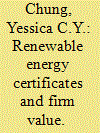| Srl | Item |
| 1 |
ID:
121743


|
|
|
|
|
| Publication |
2013.
|
| Summary/Abstract |
This study uses an unbalanced panel data analysis to examine the effects of social capital, top executive attributes and R&D on firm value in Chinese small and medium-sized enterprises (SMEs) listed on the Shenzhen Stock Exchange Small and Medium-sized Enterprises Board from 2007 to 2011. There are several interesting findings. First, the gender (male) and academic degree of the chairperson in the SMEs have a positive and significant effect on firm value. Second, social capital (measured by political connections, managerial business association networks and technology association networks) and R&D have a positive effect on SME firm value. Third, the effect of political connections on firm value for state-owned enterprises (SOEs) is stronger than for non-SOEs, while the effect of business and technology networks on firm value for non-SOEs is stronger than for SOEs. Our study has important policy implications for SMEs that want to compete successfully in China.
|
|
|
|
|
|
|
|
|
|
|
|
|
|
|
|
| 2 |
ID:
192751


|
|
|
|
|
| Summary/Abstract |
The Renewable Energy Certificate (REC) has been considered as an innovative technology for a green society. Many firms look to reduce carbon emissions and improve their environmental, social, and governance (ESG) performance using RECs. However, the impact of REC purchases on the value of firms remains unclear. This study investigates the effect of REC purchases on the stock return and volume of all REC buyers in Taiwan between 2017 and 2021. The sample consists of 266 REC transactions in the trading market. We find a positive effect of firms’ REC purchases on its stock returns in manufacturing but not the service industry. Moreover, the frequency of REC purchases is an important factor in the relationship between REC purchase and firm value. This study also investigates the underlying mechanisms of these effects. We find that public attention paid to environmental pollution is the most crucial factor associated with positive stock return and volume of a firm, while ESG disclosure is negatively associated with returns and volume.
|
|
|
|
|
|
|
|
|
|
|
|
|
|
|
|
| 3 |
ID:
193751


|
|
|
|
|
| Summary/Abstract |
Concerns about climate change and its potential economic impact have prompted policymakers and institutions to introduce standards and principles to encourage the disclosure of company risks related to climate change. Past research demonstrated that such disclosure positively impacts firm stock prices. This study analyzes the magnitude and significance of climate risk disclosures within 10-K and 10-Q reports of U.S. companies through the application of novel methods in text mining and social network analysis. Furthermore, it measures the level of attention directed towards climate change at the firm level by analyzing transcripts from earnings conference calls. The study contributes to the literature by investigating the effect of climate risk disclosure on firm market value and considering where such disclosure occurs. The findings demonstrate a positive relationship between climate risk disclosures and firm value. However, this relationship can turn negative when the attention to climate change intensifies. The results of this study are of particular relevance for practitioners and policymakers who are provided with a novel instrument to quantify the magnitude of climate change risk disclosure in textual data. Regulators can identify firms particularly exposed to climate change and create incentives for disclosure, especially when firms may be disincentivized to share information about climate change risks.
|
|
|
|
|
|
|
|
|
|
|
|
|
|
|
|